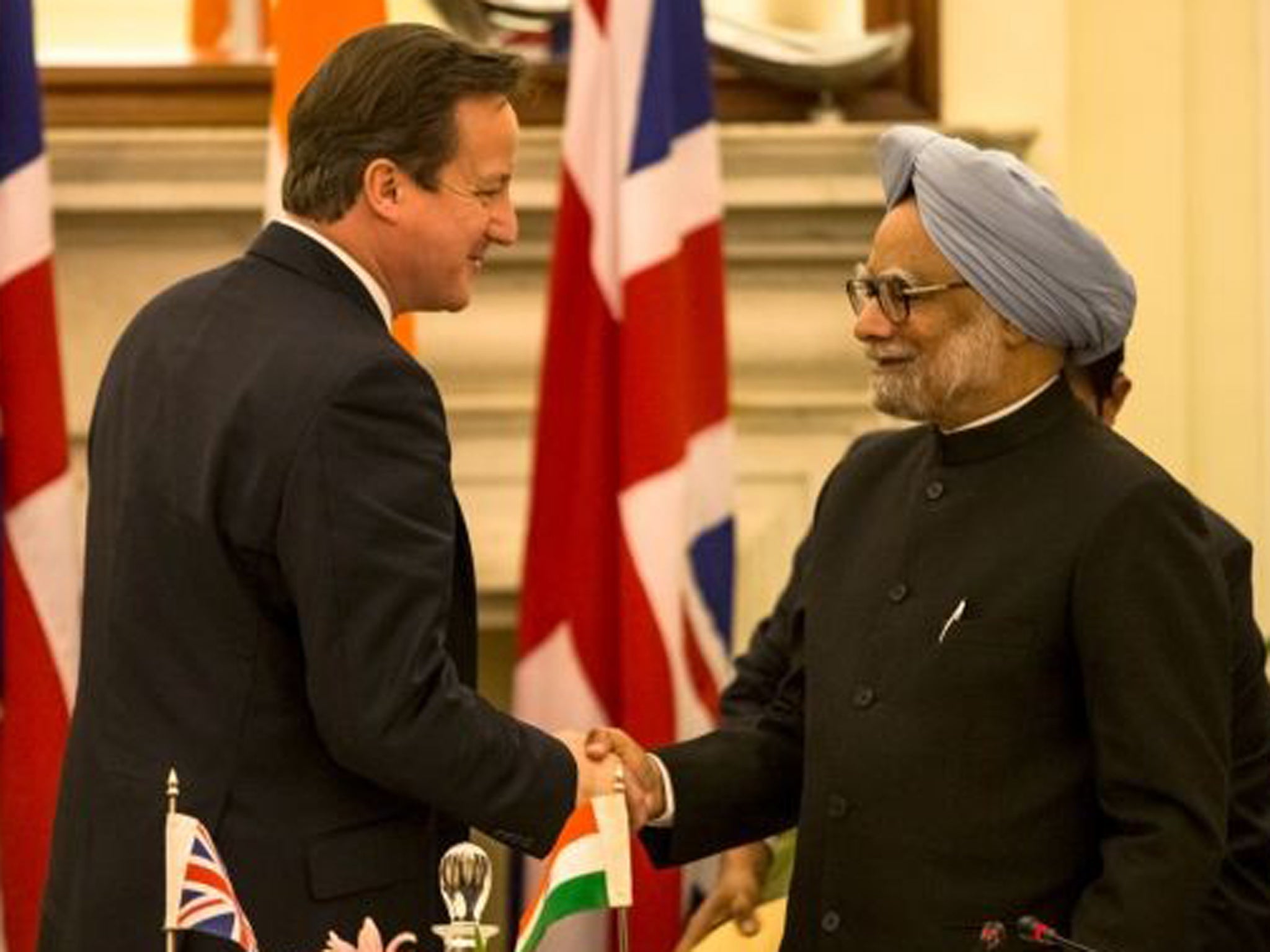David Cameron pushes Tycoon contract as Indian PM airs concerns over Anglo-Italian helicopter firm AgustaWestland 'corruption'
Allegations threaten £500m deal for AgustaWestland to transport VIPs

David Cameron was today confronted by his Indian counterpart over "serious concerns" regarding corruption allegations that have engulfed the Anglo-Italian AgustaWestland helicopter company.
The British prime minister flew into Delhi from India’s commercial capital, Mumbai, for official talks with India’s premier, Manmohan Singh and President Pranab Mukherjee. There were suggestions he may also meet Sonia Gandhi, head of the ruling Congress Party.
Before leaving Mumbai, Mr Cameron had told British media that he intended to argue the case for India to purchase the British-made Eurofighter Typhoon jets, even though his hosts had expressed their intention to sign a £6.4bn deal with French manufacturer Dassault Aviation.
“I think Typhoon is a superior aircraft,” said Mr Cameron. “I will obviously make clear that Typhoon is still available. This deal is clearly not the biggest item on this visit, but it is obviously a point we will make to the Indian authorities should they want to reconsider where they are.”
In Delhi, Mr Cameron and Mr Singh discussed a rang of subjects, including closer cooperation on counter-terrorism and cyber security, economic growth and the future in Afghanistan as Western troops prepare to sharply withdraw their numbers in 2014.
But during a joint press conference at Delhi’s Hyderabad House, Mr Singh appeared to somewhat surprise Mr Cameron by announcing that he had raised with him India’s concerns over corruption allegations that have threatened to wreck a £500m deal for AgustaWestland to provide 12 helicopters to transport so-called Indian VIPs.
“I conveyed to the Prime Minister our very serious concerns regarding allegations about unethical means used in securing the 2010 contract for AgustaWestland helicopters. I told him that we have sought an explanation from the company by February 22 to examine if the contractual conditions on unethical practices and the integrity pact have been violated,” said Mr Singh.
He added: “I have sought full assistance from the UK in this case. Prime Minister David Cameron has assured me of the co-operation of his government in the investigation.”
Mr Cameron responded by saying he was pleased Italy had launched an inquiry into the matter. He added: “In Britain, we have introduced anti-bribery legislation that is probably the strongest anywhere in the world and we will root out any problems of bribery and corruption wherever and whenever they appear.”
India has threatened to terminate the deal after Italian police arrested the former head of parent company Finmeccanica, Giuseppe Orsi, last week for allegedly paying bribes to Indian politicians to win the contract. AgustaWestland chief executive Bruno Spagnolini was also detained.
The Finmeccanica case has caused shockwaves in the defence industry in India, the world’s largest weapons importer. The defence ministry is considering cancelling the deal, which would put in question some £8bn in sales the Italian company is chasing. India has also launched its own investigation into the matter.
In today’s talks, Mr Singh and Mr Cameron agreed closer co-operation between the UK and India over cyber-security, which is expected to see the establishment of a joint task-force to share information on malicious IT attacks from criminal gangs, terrorists and state agents.
They also they signed a memorandum of understanding on bilateral civil nuclear co-operation. India already has a civil nuclear energy programme, delivering 3 per cent of the country’s electricity, but over the next 10 years Delhi wants to increase its nuclear generation fivefold.
Officials said today’s agreement will facilitate the involvement of UK firms like Rolls-Royce in the development of India’s nuclear capacity, by setting out arrangements for the transfer of sensitive technical information.
Both men stressed the importance of developing trade links between the UK and India. Mr Cameron has a target of doubling bilateral trade by 2015, and today said he wanted the accelerating growth in economic links to extend beyond that date.
Both he and Mr Singh agreed that their countries should be inextricably linked in the future and wanted to see a “very special partnership” develop between India and the UK, said Mr Cameron.
Join our commenting forum
Join thought-provoking conversations, follow other Independent readers and see their replies
Comments